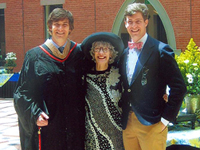About Breast Cancer
Breast cancer is the most commonly diagnosed cancer in women in the United States and the second leading cause of cancer death after lung cancer. It is estimated that one in eight women will develop breast cancer in her lifetime. Early detection is the most effective way of surviving this disease. When found early, the chance of cure can exceed 90 percent.
Breast Cancer Screening at NewYork-Presbyterian
NewYork-Presbyterian provides comprehensive breast cancer screening and prevention services, including mammography and ultrasound, enhanced surveillance, and genetic counseling and testing.
Learn more about breast cancer screening and diagnosis.
Contact Us
NewYork-Presbyterian/Columbia University Irving Medical Center
NewYork-Presbyterian/Weill Cornell Medical Center
If you are interested in a hereditary cancer risk assessment, please ask your physician at the Breast Clinic for a referral.
NewYork-Presbyterian Brooklyn Methodist Hospital
No cost cancer screening services for uninsured New Yorkers.
NewYork-Presbyterian Hudson Valley Hospital
Breast Cancer Screening Program
NewYork-Presbyterian Queens
NewYork-Presbyterian Medical Group Queens
NewYork-Presbyterian Westchester
NewYork-Presbyterian The One
Additional Information
- American Cancer Society:
Guidelines for the Early Detection of Cancer - National Cancer Institute:
Breast Cancer
Breast Cancer: Screening and Testing




